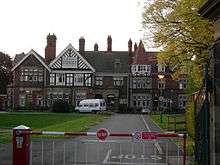HM Prison Askham Grange
HM Prison Askham Grange is a women's open category prison, located in Askham Richard village in North Yorkshire, England. The prison is run by Her Majesty's Prison Service.
 | |

| |
| Location | Askham Richard, North Yorkshire |
|---|---|
| Security class | Adult Female/Young Offenders |
| Capacity | 128 |
| Population | 120 (as of December 2019) |
| Managed by | HM Prison Services |
| Governor | Julia Spence |
| Website | Askham Grange at justice.gov.uk |
History
H.M. Prison Askham Grange was opened in January 1947 as a women's open prison and was the first such prison in the country.[1] The first Governor of H.M.P. Askham Grange was Anglo-Irish penal reformer Mary Size, who remained in post from January 1947 until her retirement from the prison service in September 1952.[2]
Mrs. Joanna Kelley was Governor from October 1952[3] until 1959, when she moved on to become Governor of Holloway and later Assistant Director of Prisons (Women).[4] She was replaced by Marguerite Stocker who remained until her retirement in 1966.[5]
In 1973 Susan McCormick was appointed Governor at Askham Grange, becoming (at 28) "the youngest ever governor or warden of a women's prison in Britain."[6] McCormick went on to introduce programmes of rehabilitation in the prison for soon-to-be released prisoners (a relatively new idea at the time).
In 1979, two inmates, Jenny Hicks and Jackie Holborough, founded the Clean Break (theatre company) at Askham Grange.[7][8] Today Clean Break is a theatre, education and new writing company that works with women whose lives have been affected by the criminal justice system.[9] The group now have links with most women's prisons in the UK.[10]
In 1997 the prison was the subject of the documentary Witness: Babies Behind Bars shown on Channel 4.[11]
In 2001 two inmates from Askham Grange launched a High Court battle for the right to keep their babies with them in prison beyond the age of 18 months. The challenge failed, but launched a wider debate in the media about mother's rights and their children in prison.[12]
The prison today
Askham Grange accepts adult females and female young offenders, and has space for ten mothers to maintain full-time care of their child or children whilst in custody. Inmates tend to have already served three years or more in other prisons, and are transferred to Askham Grange to complete the last part (maximum three years) of their sentence. Because of this the prison's main focus is the re-integration and re-settlement of prisoners into the community and preparation for life after prison.
Accommodation in the prison consists mainly of dormitories, though there are some single rooms. All prisoners in the Mother and Baby unit have their own rooms. The prison's education department mainly concentrates on vocational skills, and many prisoners are given work-placements outside the prison as part of their re-settlement plan.
The Prison has an external Garden Centre and Coffee Shop (The Grange Coffee Shop and Garden Centre) which is open to the general public seven days a week as well as a Conference Centre, all of which are operated by the residents to give them the skills to prepare for release.
Notable former inmates
- Tracie Andrews, convicted of murder for stabbing her fiancé Lee Harvey to death[13]
- Mary Bell, the infamous child killer served out the last of her sentence at Askham Grange before being released in 1980.
- Helen John, a peace campaigner, was held at Askham Grange for criminal damage whilst standing against Tony Blair in the UK 2001 General Election in his Sedgefield constituency[14]
References
- "HISTORIES OF DIFFERENT PRISONS". www.naopv.com. National Association of Official Prison Visitors. Retrieved 11 September 2019.
- Logan, Anne (2008). "Women in the Penal System". Feminism and Criminal Justice. Palgrave Macmillan UK. pp. 108–138. doi:10.1057/9780230584136_5. ISBN 9781349364268.
- "Yorkshire Evening Post". 22 August 1952. Retrieved 12 September 2019.
- "Joanna Kelley". 16 April 2003. ISSN 0307-1235. Retrieved 12 September 2019.
- "Coventry Evening Telegraph". 13 October 1959. Retrieved 12 September 2019.
- "The Evening Independent - Google News Archive Search". news.google.com. Retrieved 18 June 2020.
- Gardner, Lyn (8 November 2010). "Clean Break and the invisible women". The Guardian. ISSN 0261-3077. Retrieved 18 June 2020.
- says, Beryl. "Bitching drama – insidetime & insideinformation". Retrieved 18 June 2020.
- Trueman, Matt (26 February 2019). "'A world to escape into': how theatre gives prisoners a way out". The Guardian. ISSN 0261-3077. Retrieved 18 June 2020.
- "Now showing: Myra as Mary Magdalene! | World news". The Guardian. London. 2 March 1999. Retrieved 6 August 2012.
- "New life behind bars". The Independent. 1 April 1997. Retrieved 18 June 2020.
- "UK | Ruling against prison mothers". BBC News. 17 May 2001. Retrieved 6 August 2012.
- Wardrop, Murray (26 July 2011). "Tracie Andrews 'unrepentant' as she is freed from jail". The Telegraph. Retrieved 18 June 2020.
- "Election 2001: Jailed Peace Candidate Not Allowed to Attend Count" - The Birmingham Post (England), 6 June 2001 | Online Research Library: Questia Reader". www.questia.com. Retrieved 18 June 2020.